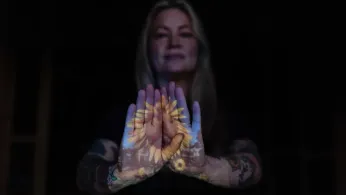
Jan 5
Amid Wildfire Grief, an LA-Area Resident Sowed Sunflowers and Hope Where Her Home Once Stood
Alex Veiga READ TIME: 3 MIN.
ALTADENA, Calif. (AP) — Missi Dowd-Figueroa brought life back to the fire-ravaged plot where her home once stood -- one sunflower at a time.
The registered nurse and mother of three lost her 1898 farm-style house in the Eaton Fire, one of two deadly wildfires that tore through the Los Angeles area last January, obliterating entire neighborhoods and displacing tens of thousands of people.
A year later, many are still grappling with grief and sorrow. Few have been able to rebuild so far, and the rest face no shortage of challenges.
“The Altadena I know and love is gone,” Dowd-Figueroa said, referring to the suburb devastated by the fire. “Everything burned down — my dentist, my pharmacy — all of it’s gone. But there’s still something about Altadena that feels like Altadena now, even though there are no homes.”
She's among those who decided to stay. Her process of healing started with tiny seeds that gave her hope and eventually turned her barren property into a flourishing garden.
Dowd-Figueroa and her family had lived in the four-bedroom, three-bath house for 10 years. It was the longest she’d ever lived in one place, and the sense of loss left her stricken by waves of sadness.
For months, she would drive to the empty lot and cry. Her grief and shock deepened when she realized that, in addition to her late grandmother’s artwork that was in her home, her father’s ashes were gone forever.
“I spent several days digging through the ashes just looking for his little urn, and I never found it,” said Dowd-Figueroa, 44.
Gone, too, were every family photo except those saved on her iPad.
“That was like a second grief, too. I was like, ‘Well, great.’ Now, if my dad knew, he’d be so disappointed because he was such a family lineage type of person,” she said. "I have nothing from my father. You know, I’ll never touch anything that he touched ever again."
Then one day, after cleanup crews had removed the last of the debris from the 2,000-square-foot lot, she brought along some flower seeds. They were mostly sunflowers, but also included zinnias and cosmos, among others, and planted them in the soil.
“I was already going there every day crying, so I was like, ‘Why am I just sitting here?’ I might as well do something that keeps me busy, and I enjoy, because the house I’m in now, I can’t have a garden,” she said.
Sunflowers can take up cadmium and other heavy metals that can be left behind in the soil, though experts debate their effectiveness after a wildfire. Dowd-Figueroa hoped they would help remove toxins on her property once she ripped them out by the roots and tossed them after they died, being careful not to leave behind seeds.
For several months, while Dowd-Figueroa and her husband took steps toward eventually building a new home, the garden flourished, blanketing a large swath of the lot with a colorful display of approximately 500 flowers — bright orange and red ones, as well as yellow ones with giant heads.
“It was really healing just to come back and tend the space where I lived for the longest time in my life,” she said.
Butterflies began to appear, along with a variety of insects and small animals.
“I felt like I was helping nature come back a little bit,” she said.
Construction began on Dowd-Figueroa’s new home in late September, thanks in part to around $100,000 in donations via a fundraising site. By then, the sunflowers, most of which bloom once and then die, were nearly all gone.
That's OK. With construction proceeding and estimated to be completed as soon as mid-June, the slowly emerging shape of her new home is now lifting Dowd-Figueroa’s spirits.
“Prior to this, I was just so depressed, like literally sobbed every day,” she said. “It just feels like now there’s a place that exists. It will happen. We can do this.”






